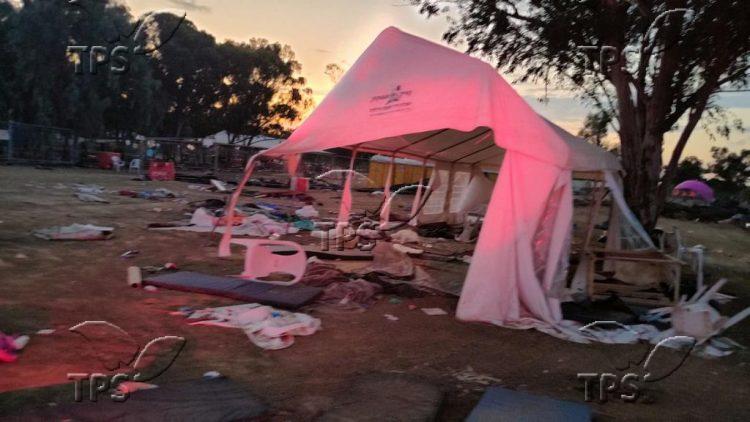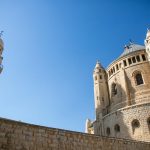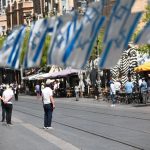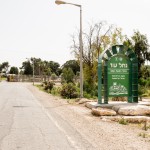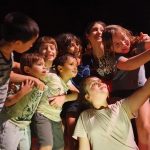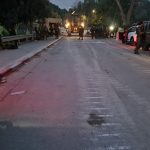Personal Belongings Tell Story of Music Festival Massacre
Jerusalem, 21 November, 2023 (TPS-IL) -- Rows of dusty sandals and sneakers, some in pairs. A bin of damaged sunglasses, a couple without lenses. T-shirts, shorts and other clothing in neat piles alongside colorful purses and handbags.
These were among the thousands of personal items left behind following Hamas’s murderous rampage at a musical festival in southern Israel last month.
Three hundred and sixty-four people were murdered at the outdoor music festival—nearly one-third of the 1,200 people killed by Hamas on Oct. 7.
The belongings, which were amassed from the scene of the deadly attack, are now laid out on rows of tables at a banquet hall overlooking the shores of the Mediterranean Sea for survivors or their families to reclaim.
The sorted items were brought here at the end of last week after being painstakingly collected by Israeli soldiers and then Israeli police in an effort to return them to survivors. Bloodied belongings were buried in keeping with Jewish religious law.
“We realized that every item that was left behind—even the smallest thing—has huge significance for the survivors as well as for family members,” said Omri Kochavi, 38, a producer of the Supernova music festival who escaped the deadly event with his wife and organized the display.
The seemingly ordinary collection of belongings at the banquet center— which is serving as a multi-faceted healing center for survivors—seems, at first glance, to resemble a second-hand store. In fact, it is anything but, and each and every item clearly seeks to offer a little closure to traumatized survivors.
“The event isn’t over,” said Kochavi, six weeks after the attack. “We are still living it.”
A Green Wallet; A Multi-Colored Scarf
“It was a green wallet,” one young woman said Monday afternoon as she gazed, in a daze, through the selection of items, before looking at the shattered sunglasses. “I was there; it was much worse than this,” she mumbled. Two friends, Niv Amsalem, 22, and Shoham Cohen, 20, were looking for a multi-colored scarf that Amsalem’s father had given him. “I didn’t even have a chance to take it out of my backpack,” he said.
Two soldiers who were at the festival embraced in tears as they sifted through the items. Deriya Petrov, 25, found both her dusty sandals, which fell off her feet as she ran from the attackers in the desert sands, as well a knapsack with her event dress still stuffed inside.
Some of the victims who found their items left them there, too scarred to take them back, volunteers said.
One survivor located his bag and, much to the astonishment of the police, who had searched the items for personal identification, found his national ID card in a hidden pocket. “I knew it would still be there,” he told them.
In all, 250 items have already been recovered by their owners since the belongings went on display on Thursday, a police official said. The items will remain in place for the next two weeks, and then be brought to Tel Aviv.
Beyond the personal belongings, it is a sense of togetherness, of a life-altering experience that unmistakably bonds the survivors sifting through the tables. Some are too upset to speak, while others dash through the piles before quickly exiting the area. Still others loiter and console each other.
Closing a Circle
Music festival producer Kochavi said that it was when he went back to the scene after the attack to retrieve personal items for his wife and then friends that he realized the importance of bringing the belongings back to their owners.
“Every morning I get up, I keep thinking this was a nightmare,” he said, recounting the 3-mile run he and his wife and hundreds of others made to get away from the terrorists. He remembers helping bandage one bleeding young woman who had been shot twice in the leg, only to send her back with security to the festival grounds, unaware that the assailants would overrun the area minutes later. Her fate is unknown.
“They would murder anyone who couldn’t escape,” he said.
His 26-year-old brother, Zohar Kochavi, who was also at the party and managed to escape with his girlfriend, immediately joined his IDF reserve team after getting back to Tel Aviv that fateful Saturday morning. He was later wounded by a grenade in Gaza and is currently recovering in hospital. The words “Nova beach” were scrawled by soldiers in the coastal strip, some of whom had been at the festival or who had seen the massacre carried out there.
Seeking to gain closure, Kochavi said that he envisions returning to the scene of the attack next year to dance once again.
“Only then will we know that we were victorious,” he said.

